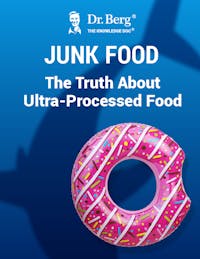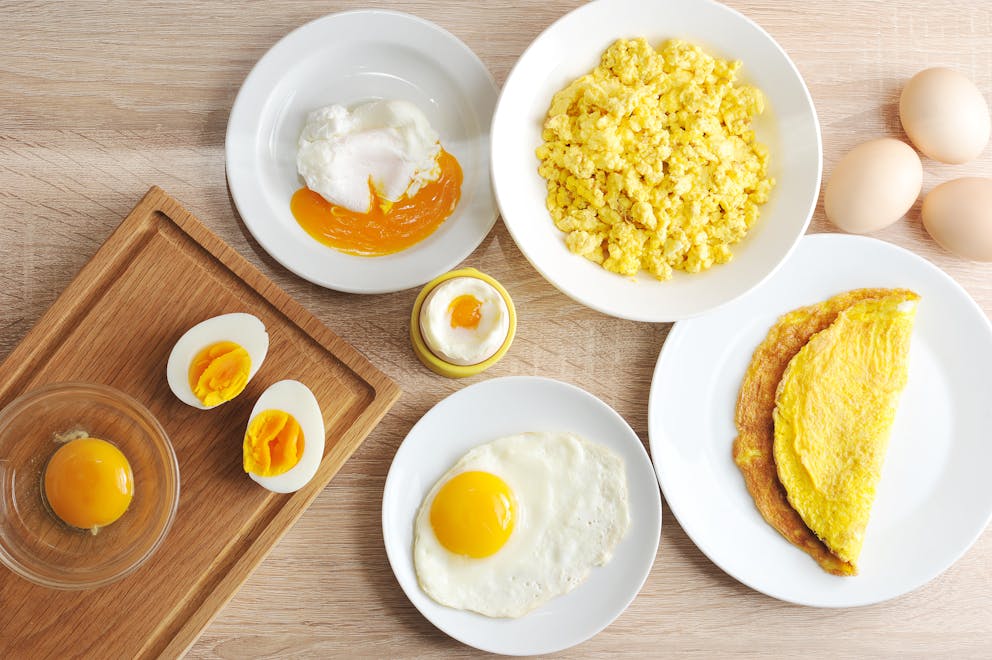Do Eggs Increase Testosterone? Best Foods for Low Testosterone

Junk Food: The Truth About Ultra-Processed Food
Learn about the detrimental impact of ultra-processed foods on health and well-being
Discover the top four dangerous hidden ingredients in everyday foods
Understand the health risks associated with consuming ultra-processed foods
Recognize misleading nutrition labels to make informed dietary choices
Get practical tips for choosing minimally processed whole foods for better health

Junk Food: The Truth About Ultra-Processed Food
Learn about the detrimental impact of ultra-processed foods on health and well-being
Discover the top four dangerous hidden ingredients in everyday foods
Understand the health risks associated with consuming ultra-processed foods
Recognize misleading nutrition labels to make informed dietary choices
Get practical tips for choosing minimally processed whole foods for better health

Junk Food: The Truth About Ultra-Processed Food
Learn about the detrimental impact of ultra-processed foods on health and well-being
Discover the top four dangerous hidden ingredients in everyday foods
Understand the health risks associated with consuming ultra-processed foods
Recognize misleading nutrition labels to make informed dietary choices
Get practical tips for choosing minimally processed whole foods for better health

Junk Food: The Truth About Ultra-Processed Food
Learn about the detrimental impact of ultra-processed foods on health and well-being
Discover the top four dangerous hidden ingredients in everyday foods
Understand the health risks associated with consuming ultra-processed foods
Recognize misleading nutrition labels to make informed dietary choices
Get practical tips for choosing minimally processed whole foods for better health

Junk Food: The Truth About Ultra-Processed Food
Learn about the detrimental impact of ultra-processed foods on health and well-being
Discover the top four dangerous hidden ingredients in everyday foods
Understand the health risks associated with consuming ultra-processed foods
Recognize misleading nutrition labels to make informed dietary choices
Get practical tips for choosing minimally processed whole foods for better health

Junk Food: The Truth About Ultra-Processed Food
Learn about the detrimental impact of ultra-processed foods on health and well-being
Discover the top four dangerous hidden ingredients in everyday foods
Understand the health risks associated with consuming ultra-processed foods
Recognize misleading nutrition labels to make informed dietary choices
Get practical tips for choosing minimally processed whole foods for better health

Junk Food: The Truth About Ultra-Processed Food
Learn about the detrimental impact of ultra-processed foods on health and well-being
Discover the top four dangerous hidden ingredients in everyday foods
Understand the health risks associated with consuming ultra-processed foods
Recognize misleading nutrition labels to make informed dietary choices
Get practical tips for choosing minimally processed whole foods for better health

Junk Food: The Truth About Ultra-Processed Food
Learn about the detrimental impact of ultra-processed foods on health and well-being
Discover the top four dangerous hidden ingredients in everyday foods
Understand the health risks associated with consuming ultra-processed foods
Recognize misleading nutrition labels to make informed dietary choices
Get practical tips for choosing minimally processed whole foods for better health

Junk Food: The Truth About Ultra-Processed Food
Learn about the detrimental impact of ultra-processed foods on health and well-being
Discover the top four dangerous hidden ingredients in everyday foods
Understand the health risks associated with consuming ultra-processed foods
Recognize misleading nutrition labels to make informed dietary choices
Get practical tips for choosing minimally processed whole foods for better health

Junk Food: The Truth About Ultra-Processed Food
Learn about the detrimental impact of ultra-processed foods on health and well-being
Discover the top four dangerous hidden ingredients in everyday foods
Understand the health risks associated with consuming ultra-processed foods
Recognize misleading nutrition labels to make informed dietary choices
Get practical tips for choosing minimally processed whole foods for better health

Junk Food: The Truth About Ultra-Processed Food
Learn about the detrimental impact of ultra-processed foods on health and well-being
Discover the top four dangerous hidden ingredients in everyday foods
Understand the health risks associated with consuming ultra-processed foods
Recognize misleading nutrition labels to make informed dietary choices
Get practical tips for choosing minimally processed whole foods for better health

Junk Food: The Truth About Ultra-Processed Food
Learn about the detrimental impact of ultra-processed foods on health and well-being
Discover the top four dangerous hidden ingredients in everyday foods
Understand the health risks associated with consuming ultra-processed foods
Recognize misleading nutrition labels to make informed dietary choices
Get practical tips for choosing minimally processed whole foods for better health

Junk Food: The Truth About Ultra-Processed Food
Learn about the detrimental impact of ultra-processed foods on health and well-being
Discover the top four dangerous hidden ingredients in everyday foods
Understand the health risks associated with consuming ultra-processed foods
Recognize misleading nutrition labels to make informed dietary choices
Get practical tips for choosing minimally processed whole foods for better health
Eating eggs is an excellent way to naturally increase your testosterone production.
Eggs are rich sources of nutrients that help boost testosterone levels, such as zinc, vitamin D, and cholesterol. They are also a perfect addition to a low-carb diet, which promotes male sex hormone balance.
Learn why you should always eat the egg yolk and what other steps you can take to naturally raise testosterone levels.

Why eggs are great for increasing testosterone
Eggs are incredibly nutritious and contain several essential nutrients that increase testosterone production.
Testosterone is a key male sex hormone that regulates the development of male sex organs and male characteristics, such as facial hair and muscle growth. It’s also important for the maintenance of bone density, sperm production, and fat cell distribution.
Here are three nutrients in eggs that help boost testosterone:
1. Zinc
Zinc controls many key hormones, including testosterone production, in both men and women. Zinc deficiency has long been recognized to cause low testosterone.
Zinc is an essential mineral that inhibits the production of prolactin, a protein that suppresses testosterone production and may cause erectile dysfunction.
2. Vitamin D
Vitamin D is a fat-soluble hormone that plays a role in boosting testosterone levels.
A study published in Hormone and Metabolic Research found that men with vitamin D deficiency were at the greatest risk of low testosterone levels, and vitamin D supplementation significantly increased circulating testosterone.
The authors concluded, “Compared to baseline values, a significant increase in total testosterone levels, bioactive testosterone, and free testosterone levels were observed in the vitamin D supplement group.”
3. Cholesterol
Testosterone is produced from cholesterol, explaining why a low-cholesterol diet or cholesterol-lowering drugs such as statins are significant causes of testosterone deficiency and increase the need for testosterone replacement therapy.
Without adequate cholesterol, testosterone levels decline and result in symptoms of low testosterone, including low sex drive, fatigue, loss of muscle mass, hair loss, and weight gain.
If you suspect that you may have developed testosterone deficiency, it's important to seek personal, professional medical advice to determine the underlying cause and to develop an appropriate treatment plan.

Are egg yolks really bad for you?
Egg yolks have been at the center of some controversy in the past due to their high cholesterol content. However, recent research has shown that consuming egg yolks is part of a healthy and nutritious diet.
Egg yolks are a good source of many health-promoting nutrients, including vitamins A, D, E, and K, as well as choline, a nutrient that is important for brain health.
They also contain healthy fats, such as monounsaturated fats and omega-3 fatty acids, which have potent anti-inflammatory properties and raise HDL cholesterol, also known as the good cholesterol linked to a lower risk of arterial plaques and heart disease.
Watch the video below to discover why eating steak and eggs helps to maintain healthy testosterone levels.
Six things that lower testosterone
You may have heard that testosterone levels decline as you get older. However, while aging may have a small impact on testosterone production, several dietary and lifestyle factors play a much more significant role in suppressing healthy testosterone production.
Here are six factors that can lower testosterone production.
1. Alcohol
Regular alcohol consumption is directly linked to lower testosterone levels. Alcohol can damage Leydig cells in the testes, the main site of testosterone production.
In addition, alcohol increases the activity of aromatase, an enzyme that converts testosterone into estrogen, thereby lowering circulating levels of free testosterone.
2. High-carb diet
A diet high in refined carbs and sugars, such as sugar, bread, cakes, pancakes, crackers, and biscuits, greatly increases the risk of insulin resistance, a metabolic condition that causes the cells in your body to become unresponsive to insulin regulation.
Insulin is an essential metabolic hormone that stimulates testosterone production in the testes.
Research published in the Journal of Endocrinology and Metabolism found that insulin resistance lowers the responsiveness of Leydig cells to insulin signaling, which suppresses testosterone production.
3. Stress
Stress has detrimental effects on testosterone levels.
During periods of stress, the adrenal glands release cortisol, a stress hormone that increases heart rate and blood pressure and mobilizes energy stores to help the body sustain the stressor.
Cortisol directly blocks testosterone production, which explains why stress increases the risk of male infertility, low libido, and loss of muscle mass.

4. Poor sleep
Restful sleep plays a vital role in regulating many hormones, including testosterone.
Disrupting healthy sleep cycles can significantly interfere with the regulation of testosterone production.
In addition, lack of adequate sleep raises the stress hormone cortisol, amplifying poor sleep's detrimental effects on testosterone production.
5. Obesity
Belly fat destroys testosterone, and obese men are at greater risk of testosterone deficiency than those with a healthy weight.
Fat cells secrete aromatase, the enzyme that converts testosterone to estrogen. Obese individuals have higher circulating aromatase levels, which can significantly lower testosterone levels.
6. Endocrine disruptors
Endocrine disruptors are chemicals or plant-derived compounds that can cause hormonal imbalance.
There are several endocrine disruptors that are believed to lower testosterone levels in men by interfering with the production, release, or metabolism of testosterone.
Here are some examples of endocrine disruptors that can lower circulating testosterone levels:
Pesticides, including atrazine and glyphosate .
Bisphenol A (BPA), a plasticizer commonly found in plastic water bottles and food containers.
Soy protein isolate is found in many diet foods and heavily processed foods.
Phthalates, a group of chemicals often used in lotions, shampoos, and soaps.

Four ways to increase your testosterone
According to Dr. Berg, “Avoiding factors that lower your testosterone production is the most beneficial way to support healthy hormone balance. But you can take a few proactive steps to help your body produce testosterone.”
Let’s take a look at four things you can do to raise your testosterone levels naturally.
1. Follow a Healthy Keto® diet
Healthy Keto is a nutritious, high-fat, low-carbohydrate diet with several health benefits supporting testosterone production.
The ketogenic diet promotes balanced insulin levels and significantly lowers the risk of insulin resistance and its detrimental impact on testosterone levels.
In addition, Healthy Keto emphasizes the intake of nutrient-dense foods rich in testosterone-boosting nutrients and cholesterol, the building block of testosterone.
2. Intermittent fasting
Combining Healthy Keto with intermittent fasting is the best way to spike testosterone and amplify the health-promoting properties of a ketogenic diet.
Intermittent fasting is a mealtime schedule that alternates between fasting and eating periods. During fasting, the liver burns stored body fat to generate energy, which supports a healthy weight and lowers the risk of insulin resistance, which supports healthy testosterone production.
Intermittent fasting also increases growth hormone, which acts as a natural gonadotropin by directly stimulating Leydig cells to produce and release testosterone.
3. Exercise
Exercise is an excellent way to boost your testosterone production. Exercise combats stress and supports restful sleep–both critical factors for healthy testosterone levels.
Exercise also supports healthy weight and increases muscle mass which is linked to increased testosterone production in men.
4. Increase testosterone-boosting foods
Certain foods have long been recognized to support reproductive health and act as natural aphrodisiacs.
These foods don’t have magical properties, but they do promote testosterone production, which helps healthy sperm count and regulates libido.
Here is a list of testosterone-boosting foods:
Red and organ meats
Eggs
Asparagus
Oysters
Truffles
Saffron
Dark chocolate (low-carb)

Key takeaways
Egg yolks are rich sources of testosterone-boosting nutrients, including vitamin D and zinc, and contain cholesterol, the building block of testosterone.
Eggs are also perfect for a low-carb keto diet, which has been found to support testosterone production by lowering the risk of insulin resistance and supporting a healthy weight.
Avoiding alcohol, regularly exercising, getting plenty of restful sleep, and reducing stress also helps to promote healthy testosterone levels and supports overall health.
FAQ
1. How many eggs boost testosterone?
Eating three eggs can significantly boost testosterone levels. However, it’s important to note that this may also depend on other factors, including overall diet, sleep quality, and hormonal balance.
2. Can two eggs a day increase testosterone?
Regularly consuming two eggs can positively affect testosterone levels. It’s important to remember that maintaining healthy testosterone levels depends on a wide range of factors, including exercise, a low-carb nutritious diet, and avoidance of endocrine disrupters such as soy and BPA.
3. What is the best way to eat eggs to increase testosterone?
Consuming whole eggs, including yolks, is important to get the maximum testosterone-boosting effects from eggs. It’s also best to cook eggs as raw eggs can be difficult to digest, and you may not absorb enough nutrients and cholesterol to promote testosterone production.
4. What food raises testosterone the most?
There are several testosterone-boosting foods, including eggs, oysters, asparagus, red and organ meats, and saffron.
5. Do egg yolks increase testosterone?
Yes, eating egg yolks helps to stimulate testosterone production. Egg yolks are rich sources of zinc and vitamin D, which promote healthy testosterone levels, and contain cholesterol which is the precursor to several hormones, including testosterone.
6. What foods can I eat every day to maximize testosterone?
You can maximize testosterone by consuming eggs, red meat, asparagus, seafood, and oysters daily. However, avoiding alcohol and following a low-carb keto diet are equally important in maintaining healthy testosterone levels.
7. Do eggs contain too much cholesterol?
While eggs contain some cholesterol, regularly eating egg yolks won’t negatively impact your cholesterol levels. In fact, consuming eggs has been found to raise beneficial HDL cholesterol linked to a lower risk of heart disease.
8. Should I only eat egg whites?
No, it’s best to eat the whole egg, including the yolk. While egg whites are a rich source of protein, it doesn’t contain the nutrients found in yolks, including zinc, iron, vitamin D and B12, folate, and selenium.
Previous blog
Honey and Garlic Benefits for Immune FunctionNext blog
The 6 WARNING Signs of DementiaTags

Popular
08/21/2024
55K views
02/23/2025
46.3K views
11/18/2024
277.5K views
03/18/2024
11/21/2022




